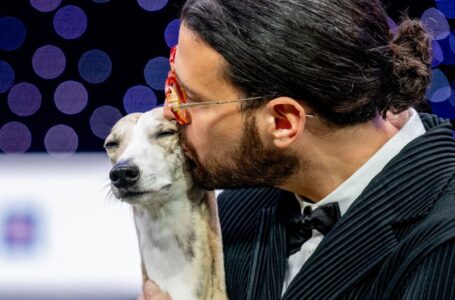Fire breaks out after tank and cargo vessel collide off UK coast
Who will be the next CNN Hero of the Year? Get to know the Top 5


Ron Davis Alvarez: New life through music
“We all need to learn from each other. We are an orchestra for everyone.”
Alvarez grew up in the favelas of Caracas, Venezuela. At 10, he joined El Sistema, a globally acclaimed program providing free classical music training to children from under-resourced communities. “I fell in love with music from my first class,” he said.
By 14, he was teaching classes; by 16, he was conducting. Eventually, Alvarez worked for El Sistema to help spread their innovative teaching methods worldwide. It was this work that led him to first visit Sweden in 2015.
Alvarez was in Stockholm just as unprecedented numbers of refugees were arriving in the country, most from Syria, Iraq, and Afghanistan. He was struck by their plight and wanted to help. After moving to Gothenburg the following year, he created a music group for refugees and started with 13 students. He knew playing music together would help them make friends, express themselves, and rebuild their self-esteem. He named the group the Dream Orchestra to emphasize their potential.
Eight years later, the program has more than 300 members, from 3 to 56 years old, of more than 25 nationalities. While many are immigrants and refugees, the group also includes many second-generation immigrants as well as native Swedes.
Stephen Knight: Saving the lives of dogs and their owners
“When somebody makes that decision to go into treatment, it’s one of the biggest decisions, the bravest decisions, they’ll make.”
In 2011, when Knight was 51 years old, he had lost everything to meth addiction – his family, his job, his home, and nearly his life. HIV positive and living out of his car, Knight entered rehab at the behest of his mother.
Eight months into recovery, Knight answered the door of his sober living apartment to find a friend in tears. She had relapsed, and in her arms was a 15-pound Maltese/Dachshund mix named Jayde. Knight’s friend said no one would take Jayde, and she asked Knight for a ride to a shelter so she could surrender her.
Instead, Knight became a dog dad to Jayde. He soon learned that other people struggled to find temporary homes for their beloved pets when they needed to enter rehab, often delaying or forgoing substance abuse treatment because of it.
Today, Knight and his organization, Dogs Matter, provide foster care for pets while their owners are in rehab. They vet applicants, conduct animal behavior assessments, and execute contracts that require participants to stick to their recovery plan and complete a 12-month post-release wraparound program. His nonprofit has helped more than 1,200 dogs and their owners.
Payton McGriff: Empowering girls and elevating women
“Talent and resilience and resourcefulness is so equally distributed worldwide, but opportunity is not.”
A marketing major, McGriff was pursuing her dream job in business when she took an entrepreneurship class her senior year at the University of Idaho. Tasked with creating a business or nonprofit, she remembered reading that many impoverished families who want to educate their daughters can’t afford tuition fees, school supplies, and the uniform mandated in many countries.
She connected with her professor, who encouraged her to join a spring break trip to his home country of Togo. There, she saw first-hand the reality of what girls faced and sought solutions. “A uniform is typically one of the more expensive pieces,” McGriff said. “They can be one of the most cost-effective ways to keep girls in school.”
Ultimately, McGriff founded Style Her Empowered, known as SHE. In their first year, the group hired local seamstresses in Togo and provided uniforms and school fees to 65 girls. But the girls quickly outgrew their uniforms. That problem led to her team’s creation of ‘the uniform that grows.’ Designed by the seamstresses – with input from the students, McGriff, and others – the dress now has adjustable elements that create a tailored fit for every body type and enable it to grow up to a foot in length. The uniform can fit a girl for up to three years, adjusting six sizes; when outgrown, it can be handed down to younger girls.
Today, SHE provides 1,500 girls a year in Togo with free uniforms, school fees, supplies, tutoring, and much more, while also bringing opportunities and education to the women they employ.
Rachel Rutter: Supporting ‘the newest newcomers’
“They’ve already been through so much trauma, it can be jarring when they arrive here and realize that it’s really just beginning.”
As an immigration lawyer who works closely with unaccompanied migrant children, Rutter knows how long and difficult their journeys are and the desperate situations they are fleeing. Early on, she saw the hurdles her young clients had to overcome after arriving in the US. They lacked stable housing and consistent meals and needed mental health and academic support.
“I saw that these kids don’t just need legal status, they also need all of these other things if they’re going to really heal and be successful,” Rutter said.
Compelled to fill in those gaps, she created Project Libertad in 2015. The nonprofit provides free legal representation, essential and social services, and newcomer support programs to immigrant youth. The organization has assisted more than 1,100 individuals, representing more than 90 young people in immigration cases.
Through their Immigrant Children’s Defense Project, Rutter and her group protect vulnerable youth across Pennsylvania, helping them apply for immigration status and representing in court those who are facing deportation.
Yamilée Toussaint: Lighting up the stage with STEM
“I just started to wonder about a world where the benefits that you get from dance can lead to the outcomes that we’re looking for in STEM.”
Growing up, Toussaint had a love for math but says the dance studio was her “home away from home.” This dual passion led her to study mechanical engineering at MIT, where she was also head of the dance team. She noticed that she was one of only two Black women in her major. Later, while teaching high school math, she became determined to empower girls of color to get excited about science, technology, engineering, and math.
In 2012, she created STEM From Dance, a nonprofit program that combines dance with STEM education to make these subjects more engaging and accessible. Today, the program works with girls of color ages 8 to 18 in nine cities across the US and is free to its participants.
The organization’s school and summer programs typically attract girls who identify as dancers but are hesitant about STEM. Through the supportive community and hands-on projects, the girls begin to see themselves as programmers, engineers, and innovators.
“Through dance, we’re able to create this atmosphere that feels comfortable,” Toussaint said. “And with that space, we’re able to introduce something that feels kind of intimidating.”
Working in small groups, the girls choreograph dance routines that include STEM elements, such as LED light strips that they code to light up with the music. The girls also create songs through computer science that they incorporate into their performance. To date, more than 2,000 girls have benefitted from the program.
Apple Podcasts
Spotify
Amazon
Pandora
RSS
iHeart Radio
TuneIn
Radio.com











